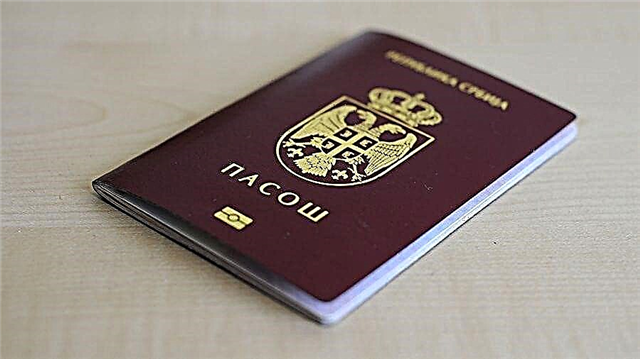The interest of Russians in obtaining Serbian citizenship is due to a number of features of this state, including: a favorable climate, a stable economic situation and the prospect of joining the European Union. The process of obtaining Serbian citizenship, in spite of its length, is relatively simple.
Criteria for applicants
Individuals who meet a number of criteria established by local migration legislation can apply for citizenship. Among them:
- Reaching the age of majority (18 years old);
- Full legal capacity;
- Absence of contagious diseases (in particular, HIV infection);
- Financial independence;
- Having your own (or rented for a long time) housing.
These requirements are not universal for all categories of applicants. The specific list depends on the circumstances that became the basis for the nomination of a candidate for entering Serbian citizenship.

Prohibition on entering citizenship
According to Serbian law, the following persons cannot become citizens of the state:
- Wanted by Interpol;
- Criminally prosecuted in their home country for acts that provide for similar punishment in the local criminal code;
- Members of the armed forces or special services of other states;
- Suspected of having links with terrorist and / or criminal organizations;
- Those who fought against the Serbian army during the war in Yugoslavia;
- Subject to extradition to their homeland in accordance with the request received from there.
Foundations
The procedure for obtaining citizenship largely depends on the reason that became the basis for the nomination of the applicant.
The following grounds are provided:
- Right of birth and / or origin;
- Natural naturalization;
- Marrying a Serbian citizen;
- Other grounds.
Right of birth and origin
You May Also Like
Birth right is relevant for candidates who have at least one of the parents at the time of the candidate's birth was a Serbian citizen. This right is confirmed by the presence of a corresponding mark in the birth certificate.
The right of origin applies to applicants who previously had Serbian citizenship, but for any reason have lost it (the exception is deprivation of citizenship by decision of local authorities). Also, this right can be used by persons with direct relatives who are citizens of Serbia.
For all designated categories, the procedure under consideration is carried out in a simplified manner.
Naturalization
For a number of objective reasons, this reason is the most common among citizens of the Russian Federation seeking to obtain Serbian citizenship. At the same time, in some aspects, the procedure is more complicated compared to other options.
In particular, the following are also added to the above criteria:
- Legal status - permanent resident (hereinafter - permanent residence);
- The period of residence is at least three years in the status of permanent residence until the moment of submission of documents for entry into citizenship;
- Recognition of Serbia as their homeland and taking the oath of allegiance.
Getting married
The main condition for the implementation of this option is that one of the spouses has Serbian citizenship. At the same time, the term of the state in marriage must not be less than three years, and the applicant's spouse, in addition to meeting the established criteria, must have a valid residence permit (hereinafter - residence permit).

Other grounds
Other grounds for obtaining citizenship are:
- Buying real estate on the territory of the state (condition - the cost of the acquired real estate must exceed 200 thousand €);
- Committing acts that local law equates to special services to the state (for example, charitable activities with donations for a total amount of at least 70 thousand €);
- Investing in the local economy (condition - the amount of investment must exceed the amount in 300 thousand €).
You May Also Like
Possibility of obtaining dual citizenship
Serbian legislation allows for dual citizenship, but this possibility applies only to:
- Persons who have received Serbian citizenship for special merits (activities in the fields of culture, charity, economic development, etc.);
- Legal spouses of Serbian citizens;
- Persons for whom entering a new citizenship is fraught with the loss of the previous one;
- Participants in the state family reunification program;
- Ethnic Serbs - citizens of other states permanently residing in their territories.

Procedure
A schematic procedure for obtaining Serbian citizenship by a Russian consists of the following stages:
- Initial registration (entitles you to stay on the territory of the state for 1 month);
- Obtaining a residence permit (gives the right to stay on the territory of the state for 1 year);
- Obtaining permanent residence status (gives the right to permanent residence for 5 years);
- Submission of documents for the assignment of citizenship;
- Further actions (depending on the decision of the authorities).
Initial registration
Upon arrival on the territory of the state, you should acquire housing (if this has not been done in advance) and register with the migration registration at the local police station (state duty ~ 2 €). Then you should open a bank account of an individual, to which you need to deposit less than 3.5 thousand €, as well as pay the appropriate fee (~ 200 € per person). After that, you can apply for a residence permit.
Legislative norms regarding the implementation of this procedure establish a mandatory condition for the applicant to have any grounds, including:
- Ownership of real estate located within the state;
- The presence of relatives living in the territory of the state and who are citizens;
- Implementation of labor or business activities;
- Passage of training.
Obtaining a residence permit
All documents (both for obtaining a residence permit and for further actions) are submitted in Serbian; for documents of a domestic sample, notarized translations are required.

To obtain a residence permit, you should prepare:
- International passport (validity at the time of submission - at least six months);
- Certificates - registration at the place of residence and payment of state fees;
- Bank statement, copy of health insurance (registration cost - from 60 €);
- 2 color photographs (30 × 40 mm);
- Application for a residence permit (indicating the grounds and documents confirming the legality of the request);
- Other documents (depending on the specific situation - birth certificates of a child, enrollment in an educational institution, marriage, etc.).
Documents are submitted to the police department (department for work with foreign citizens) at the place of registration. The approval procedure takes from 10 to 30 days.
Residence permit validity period - from 3 months to 1 year, it is advisable to submit an application for its extension at least one month before the expiration date. The procedure and the list of documents required for this are similar to the above, while photographs are not required for renewal.
Obtaining permanent residence status
To obtain permanent residence status, an applicant must stay in the state for at least 5 years (3 years - in case of marriage with a local citizen) on the basis of a valid residence permit. During this period, he has the right to be absent from Serbia for no more than 10 months in total, the maximum possible period of one trip is 6 months.
The procedure for obtaining permanent residence status is in many ways similar to the procedure for obtaining a residence permit.The only difference is the content of the application and the period for its consideration (from 1 to 3 months). The permanent residence status can subsequently be canceled if the foreigner leaves Serbia for a period exceeding 1 year.
Preparation of documents for obtaining citizenship
After the expiration of the three-year period spent in permanent residence status, the applicant has the right to apply for Serbian citizenship.
To do this, you need (including certified translations):
- Relevant application and biography of the applicant;
- Certificate of the absence of outstanding convictions in the Russian Federation (valid for six months);

- A valid international passport;
- 4 photographs (30 × 40 mm);
- Statement of income, or bank statement;
- Other documents (depending on the situation).
Next steps
The application and the package of documents are submitted to the Migration Board under the Ministry of Internal Affairs of Serbia. The term of consideration is up to 1 year, each application is considered by the commission individually.
Upon approval of the possibility of entering citizenship, the applicant is obliged to pass a test for knowledge of state laws and traditions (while knowledge of the language as a prerequisite is not provided by the law).
If the test fails, citizenship is not issued, but the number of retake attempts is not limited. Upon successful passing of the test and immediately before receiving a Serbian passport, the applicant must swear an oath of loyalty to the state and the Serbian people.
Possibility of failure
The grounds for refusing to accept Serbian citizenship can be:
- Lack of necessary documents, or their non-compliance with the established requirements;
- Low income;
- Doubtful origin of income;
- Cases of violation of local (including migration) legislation;
- Providing false information and / or documents.
Further actions depend on the reason for the refusal. In cases 1 and 2, the applicant can correct the violations or inconsistencies and re-submit the application.
In other situations (3-5), citizenship, as a rule, can be obtained only on the basis of an appropriate court decision. To do this, it is advisable to involve a local lawyer who has a successful practice in such cases.
Statistics show that half of the appeals ultimately lead to the granting of citizenship.
Conclusion
The procedure for obtaining Serbian citizenship is relatively simple - but only under the conditions of strict adherence to the requirements of local legislation, as well as the compliance of applicants with the established criteria and requirements.











